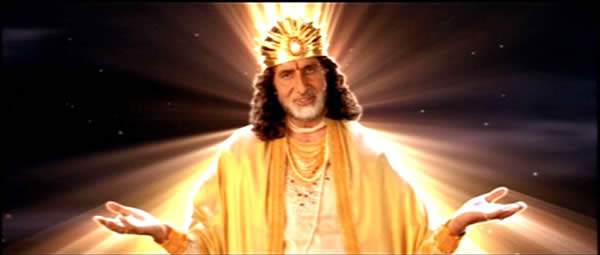
AGNI VARSHA
(“Fire and Rain”)
2002, Hindi, 130 minutes
Directed by Arjun Sajnani
Based on the play “The Fire and the Rain” by Girish Karnad
Screenplay: Arjun Sajnani, T. Jayashree, Anil Mehta; Dialogue: Atul Tiwari; Background score: Taufiq Qureshi; Music: Sandesh Shandilya; Lyrics: Javed Akhtar; Art direction: Shashi Adappa; Cinematography: Anil Mehta
This strange, spectacular film returns to the mythological roots of Hindi cinema, via a tale from the epic Mahabharata that was subsequently dramatized by renowned playwright and actor-director Girish Karnad. Here it is again reworked into a film that stylistically positions itself between art and popular cinema; shot entirely outdoors in the magnificent ruins of the 15th century city of Vijayanagara in Karnataka and with subdued and (mostly) historically plausible props and costumes, yet incorporating mainstream stars and contemporary music and choreography. The result is visually interesting, but the complex and disturbing story may seem merely weird to viewers lacking prior exposure to the several cultural themes that the film invokes—indeed, even those who have had such exposure may (like me) find the film ultimately puzzling. The grim, transgressive tale of Yavakri and his associates is hardly the most accessible of Indian legends, though its resemblance to Greek and Shakespearean tragedy doubtless attracted Karnad and may also have encouraged the filmmakers to pitch it toward an international audience (AGNI VARSHA was India’s entry in the Commonwealth Film Festival in 2002).
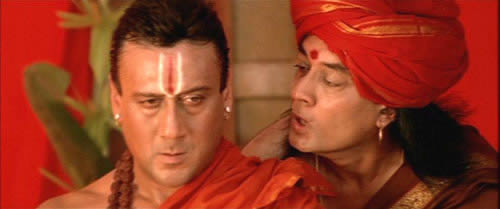
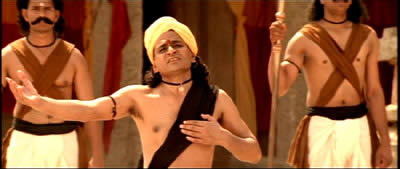
As the film opens, an ancient kingdom, afflicted by a decade of drought, is sponsoring a seven-year fire sacrifice or yagya to appease Indra, king of the Vedic gods and bringer of the monsoon. As the ritual, conducted by the stern royal priest Paravasu (Jackie Shroff), nears its end, the sutradhar or leader of a troupe of actors camped outside the city gates (Raghuvir Yadav), petitions the king and his priest for permission to enact a drama. The play is to depict the slaying by Indra of his arch enemy, the water-hoarding serpent Vritra—the most important Rig Vedic myth, which itself dramatizes the release of the heavenly waters that the demonic Vritra is restraining, though this can only be accomplished through a transgressive act, since Vritra is also a (sacred and inviolable) brahman.
But the actor’s short speech alludes to yet more: the origin myth of Indian drama in the classic (ca. 2nd century?) Sanskrit treatise Natya Shastra, wherein theater is created by the gods in heaven, but its actors are soon, in punishment for on-stage improprieties, banished to earth and reborn as lowly shudras (the lowest of the four ancient social classes)—a myth that accounts for both the high valuation of drama and the apparently low status of actors in ancient India. Here, the troupe director, averting his eyes from the sacrificial enclosure lest his gaze pollute the holy fire, audaciously proposes that the gods may not be appeased by sacrifice alone, but will require entertainment. Moreover, he requests that, in his troupe’s performance, the role of Vritra be assumed by none other than the chief priest’s own junior brother, Aravasu (Milind Soman), a fallen brahman accused of the unspeakable crime of patricide. To everyone’s surprise and against the advice of the king, Paravasu consents to both requests.
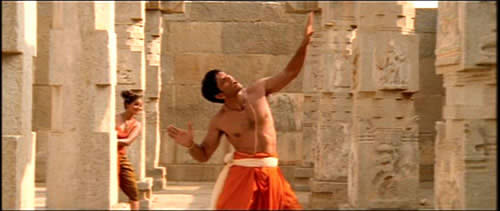
This opening scene thus quickly establishes a variation on the mighty Mahabharata’s central theme of rivalry and conflict between brothers, and this soon expands (again in Mahabharata--esque fashion) into a veritable fugue of further variants, through a long flashback (comprising most of the film) that explains how poor Aravasu fell into his sorry state. The handsome but simpleminded youth has two loves: theater, and the outcaste tribal maiden Nittilai (Sonali Kulkarni), whom he yearns to wed despite her father’s distrust of brahmans. The lovers are encouraged by Aravasu’s uncle, the blind sage Andhaka (Zul Vellani), who (we soon learn) was himself wronged by his own brother, the ambitious and arrogant brahman Raibhya (Mohan Agashe), Paravasu and Aravasu’s father. We further learn that Andhaka’s son Yavakri (Telugu star Nagarjuna) has recently returned from an arduous (and, it is rumored, successful) ten year quest for “knowledge of the Absolute” (brahma-jnana).
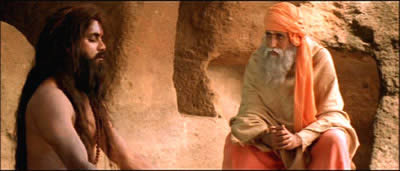
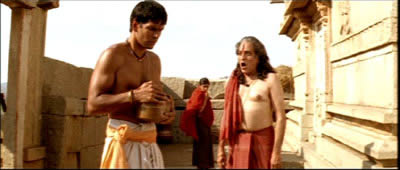
Whatever knowledge he has gained, however, does not seem to have given him detachment. Yavakri too resents the elevation of his cousin to the status of royal priest, especially since Paravasu has, during his long absence, wed Yavakri’s own youthful love, the beautiful Vishaka (Raveena Tandon). Taking advantage of Paravasu’s preoccupation with the sacrifice and his wife’s resentment of this (the royal priest has not visited his home or bed for seven years), Yavakri accosts Vishaka while she is going to fetch water, and the two (after a flashback in which Vishaka recalls her marriage and the happy year of love-making that followed, before Paravasu stalked off to the sacrificial enclosure) get down to serious business in a cave, where they are accidentally discovered by Nittilai and Aravasu.
Now the aspiring actor’s troubles begin in earnest. Returning home late with his errant sister-in-law, Aravasu is assailed by his hot-tempered father, who accuses him of having seduced her. Abused by Raibhya (who, it is hinted, may himself have previously molested her), Vishaka reveals that she has in fact made love not with Aravasu but with Yavakri, the son of Raibhya’s brother and rival. Raibhya flies into a rage and determines to destroy this nephew (whose attack on his daughter-in-law’s chastity threatens the completion of Paravasu’s yagya). Charging a pot of water with the power of mantras, Raibhya extracts one of his own hairs and forms it into a brahma-rakshasa or “brahman-demon”—a sort of homegrown Terminator with Rasta hair and green eyeshadow (played by Tamil dancing star Prabhudeva). Yavakri is unafraid, however, because he has his own mantra-charged waterpot that can keep the demon at bay. But when the spirited Vishaka figures out that Yavakri seduced her only in order to get back at her husband, she overturns his pot, permitting the rakshasa to slay him. Poor Aravasu has to console his blind uncle (who soon dies of grief anyhow) and then cremate his unfortunate cousin, and all this makes him late for the tribal council at which he was to have petitioned Nittilai’s father for her hand. As a result, the distraught maiden is given to another tribal youth. Aravasu returns home in anguish, but his bad day is not over yet.
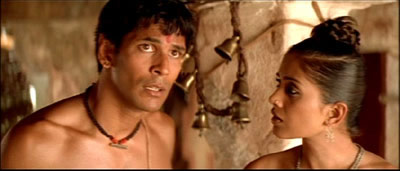
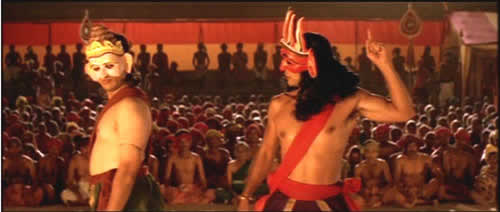
As the rumor of Vishaka’s infidelity spreads through the city, priest Paravasu makes a secret visit home—another transgression that could seemingly wreck the ritual, though he appears as unconcerned about this as about his wife’s misdeed. Further transgressive revelations soon follow, which cause the plot to move in an unexpected direction, leading to another bloody murder and to yet more grief for the young Aravasu. Ultimately the flashback ends and the junior brother dons Vritra’s red mask to confront his elder during the climactic performance by the drama troupe, when all the fratricidal strands of the story come together in a fiery finale that provokes an epiphany: Indra himself appears, proving to be—who else?—Amitabh Bachchan (who, at age 60, gives the lie to the old adage that the gods always look 25).
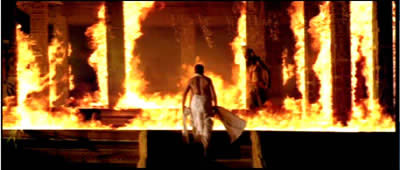
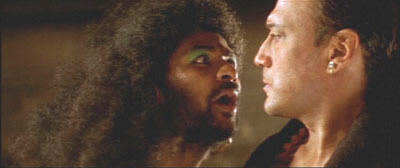
Apart from the opportunity to see several popular stars in highly unusual roles (e.g., action hero Jackie Shroff as a pious vedic priest—although casting the host of Indian TV’s “Kaun Banega Crorepati,” the Hindi incarnation of “Who Wants to be a Millionaire,” as an enigmatic, boon-granting Indra seems appropriate enough!), and beautiful camerawork that makes good use of the grandeur of Vijayanagara’s awesome rock formations and “World Heritage” monuments, the film boasts strong performances by young Milind Soman and Sonali Kulkarni, who initially appear (in the lovesong Dole re, “Beloved, my heart is swaying”) as just another pair of pretty bimbos, but develop depth as the story unfolds, to ultimately become its embodiment of sacrifice and redemption.
After viewing the film twice, I found myself beguiled by its attractive visuals and non-standard storyline, but left with a feeling of uncertainty (such as I sometimes have on waking up from a particularly vivid dream) as to what it was trying to tell me. Was this director Sajnani’s intention, or did he just not sort it all out carefully enough? Some potentially implied messages—none especially highlighted—seem to be that brahmans are a nasty lot, that jealousy, rape, and incest often have unpleasant consequences, and that the pure in heart (and simple in mind) eventually will see God (or at least A. B. wearing a gold-lamé crown). Caste boundaries oppress people, compassion—even for a demon—is better than personal gain, and theater, the medium of the People, is preferred (even by the celestials) to elite courtly ritual. The gods watch our human tragedy with detached amusement, and even when they intervene and grant boons they caution us against reversing the inexorable flow of time.
For those who are interested, the Mahabharata story on which the play and film were based is likewise strange and confusing, but significantly different, and it has another (and clearer) agenda: to emphasize the importance of the disciplined life of vaidika brahmans (those who learn the fire rituals during long years of study with a teacher of their priestly lineage) over the freestyle ways of ascetics (tapasvins), who seek to obtain knowledge and supernatural powers through extreme asceticism and (in effect) arm-twisting the gods. In this version, Raibhya is a vaidika specialist, as are both his sons (Paravasu and—here—Arvavasu); his friend (but not brother) is an ascetic named Bharadvaja, whose son is Yavakri (a.k.a. Yavakrita). Jealous of Raibhya and his sons' high status, Yavakri obtains limited vedic knowledge from a very reluctant Indra, and then becomes puffed up with pride and rapes Paravasu’s wife (who does not submit to him willingly). In retaliation, Raibhya transforms two hairs from his head into male and female demons who slay Yavakri; Bharadvaja dies of grief over his only son’s death, after (reluctantly) cursing his friend Raibhya to be slain by his own son. Paravasu kills his father by accident, in the dark (there is no hint of bad feeling between them), and his brother Arvavasu atones for the crime so that Paravasu can complete a royal sacrifice. After the atonement rituals are over, though, Paravasu continues to snub his brother as a brahman-slayer; the gods then intervene, making the righteous Arvavasu the new royal priest and granting him boons: he chooses to restore his father, Bharadvaja, and Yavakri to life (a time-reversing choice that Indra advises against in the film), and to release his brother from the memory of his patricide. There is no Nittilai here, no worry over the fate of the avenging rakshasa (or his female accomplice), and no play-within-a-play (though Yavakri is told an admonitory story by his father concerning the danger of pride). See Mahabharata (Pune critical edition) 3.33.135-139. For an English translation, see J. A. B. van Buitenen, The Mahabharata, Volume 2 (Chicago: University of Chicago Press, 1975), pp. 482-490.
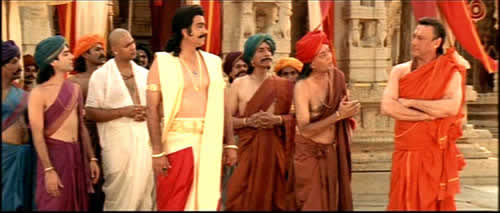
Girish Karnad's play, "The Fire and the Rain," was commissioned by the Guthrie Theater of Minneapolis, Minnesota (USA), and originally written (as are all Karnad's plays) in his mother tongue of Kannada, then translated by the author into English. It is published by Oxford University Press (1998). The play premiered at the Guthrie as planned, but a later Indian production was directed by Arjun Sajnani, who later made the film. Although most of the dialogue and incidents in the film follow the original script quite closely, large portions of it have been deleted (probably to make room for the four songs, in hopes of drawing a larger audience), and this badly hurts the coherence of the screenplay. Thus for example the themes concerningthe role of theater and actors in ancient India, of intercaste tension, and of the suffering of the manufactured rakshasa all emerge much more clearly in the written version. Interestingly, the subtitles sometimes follow Karnad's English text, substituting earthy idioms ("shit on his sacrifice," "I'm going to squeeze his balls") for the much more chaste Hindi vocabulary substituted (for reasons unknown, since Hindi has no shortage of such expressions!) in the screenplay.
[The image quality of the Cinebella DVD of AGNI VARSHA is what one expects of a recent film. Subtitles are provided for the film’s four songs.]